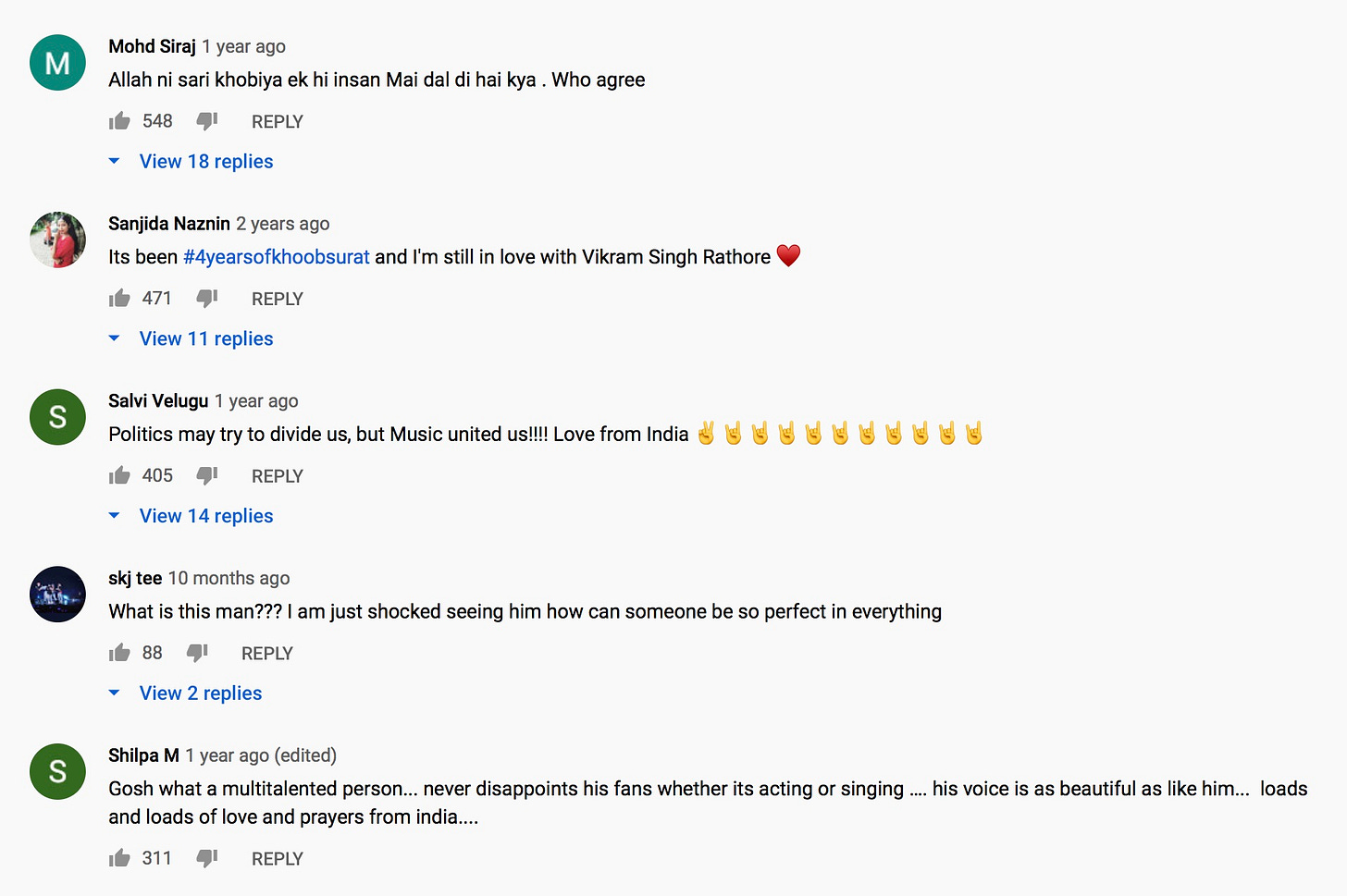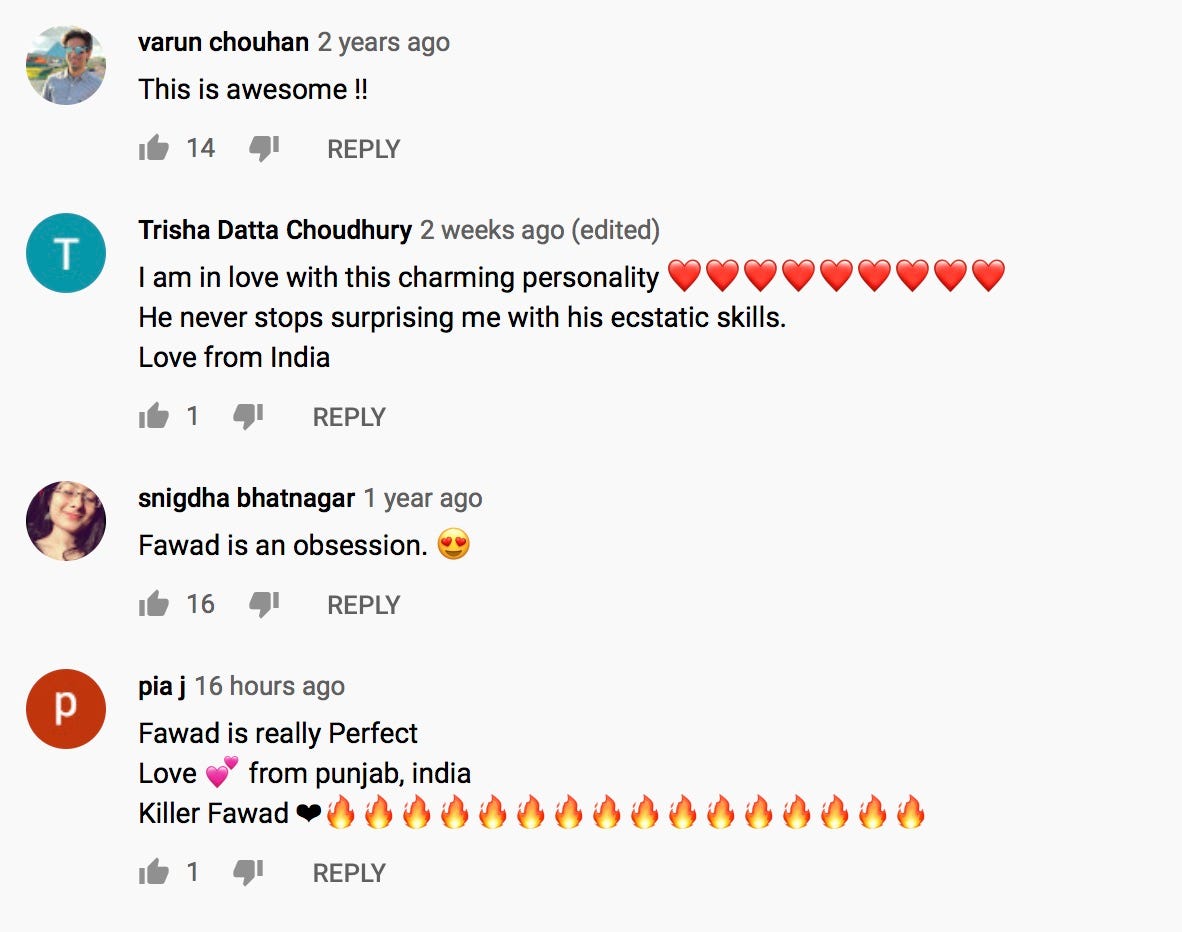The quiet magic of the Fawad Khan fandom
When things are rotten on the Internet and everywhere around, there's a place to go.

When Fawad Khan arrived on Indian screens in 2014’s Khoobsurat, he was met with a collective swoon. Indian women, long starved of anything quite as gorgeous as this newest Khan, flocked to the theatres. Reviews (like this one) barely remembered to mention Sonam Kapoor, the ostensible star of the film, or even the film itself. Our Pakistani counterparts, a little more immune to Fawad’s on screen charm, managed to actually watch the film without being distracted before reviewing it (well done, you). But the verdict was unanimous- in Fawad Khan, the women of the subcontinent finally had the hero we so richly deserved.
But unlike Sonam Kapoor, none of us got our happily ever after. After another charming performance in 2016’s Kapoor and Sons, we were treated to a far more familiar, far more ugly plot - When Politics meets Bollywood (we’re all currently watching the sequel with the death of Sushant Singh Rajput). An irate MNS, a spineless Karan Johar, and an urge to take out political and intelligence failures on someone, anyone, before the 2019 Lok Sabha polls, and Fawad Khan was gone, together with a whole host of other Pakistani artists working in Bollywood. Pakistan retaliated by banning Indian movies, and we were left mourning that brief collective joy we had all known. False news reports were circulated in India about what he is supposed to have said on landing in Pakistan, and the rage cycle began. Fawadmania, it seemed, was well and truly over.
I have a personal confession to make. I missed all of this. Yes, I’m not quite sure how, but even surrounded by die-hard fans (who’d watched Zindagi Gulzar Hain back in 2012 on grainy YouTube), stuck in the depths of particularly rottenly busy time at work, I missed Fawadmania. By the time I came up for air, he was gone. And so it would have ended, if it hadn’t been for this lockdown.
Inspired by a stray picture somewhere on Twitter, I finally watched Zindagi Gulzar Hain (2012) with the gorgeous Sanam Saeed. Setting aside the deeply troubling toxic misogyny (there’s a whole article waiting there), I was hooked. There was a world of Fawad Khan serials to explore, and the game was afoot! After rapidly making my way through the slightly vapid Humsafar (starring the Mahira Khan), which was also on Netflix, I was on the hunt for more. Der aaye durust aaye, probably best describes my entry into the Fawad Khan fandom and I was suitably rewarded with Behadd (2013), that rare Pakistani movie where Fawad actually gets to play a truly nice man, starring the charming Nadia Jamil. I then wept my way through the trials of the feisty Sanam Baloch in Dastaan (2010) (a show that I later learnt did air successfully in India, despite it’s one sided partition narrative), after which I found myself in Fawad Khan wilderness. There was nothing more on Netflix or Eros Now or Zee 5 or any nice high quality streaming service. A sensible person would have stopped here (I am not a sensible person). Onward, and I was now in the territory of grainy YouTube videos. Akhbari Asghari (2011), a slapstick Punjabi comedy about two UK born sisters who return to Pakistan to marry their rural cousins, which reunited Khan and Sanam Baloch, proved to be eminently watchable (despite my not understanding a word of Punjabi). Next on the list were the charmingly funny Jutt and Bond (where the Fawad television magic all started), and the notoriously difficult to get hold of 2008 coming of age road-trip drama, Satrangi (Fawad recently reprised the title song on Battle of the Bands).
But what I lost in picture and sound quality, I found in community. Scrolling through the YouTube comments in 2020, I realised something incredible. I wasn’t alone. Fawadmania wasn’t dead. It was merely biding its time, quietly and patiently on the internet. All the best aspects of Fawad love were still around. Fans from India asking “Love for Fawad from India. Should I watch Askh first or Numm?” and receiving prompt replies from Pakistan “watch Numm, it addresses an important social issue” (Oh, though if anyone is interested, the real answer is “Watch neither, they’re both atrocious and not even your love for Fawad will get you through them with your sanity intact”).
YouTube comments on Entity Paradigm (he was in a band! he sings! is there anything this man can’t do?) are even kinder.

In numbers, and in spirit, Indian Fawad fans are still out there.

And while everyone may not share one gentleman’s enthusiastic suggestion of gheraoing producers’ offices to bring back Fawad Khan ( a touching tribute to both Khan and Gandhian method), the spirit certainly resonates.
The Fawad love goes on.

And on

It cuts across gender and religion and caste.

And the best part is the timing of it. In the middle of the insanity, the blatant communalism and the hatred of the politics of the last few years, Fawad fans were quietly out there, expressing cross border love.

There are few things more fascinating than the relationship between ordinary Indians and Pakistanis. We’re capable of being madly jingoistic online or at a cricket or hockey match (ask any fielder who had had the misfortune to field in the outfield in an India Pakistan match), calling for each others blood and raging at the infamy of military and political actions, but put us face to face, in person, and something curious happens. The hatred vanishes or is at least suspended, consumed by an incredible curiosity. Who are these people, we ask ourselves, in wonder. We reach out tentatively, drawn by the strange feeling of meeting “foreigners” who are yet, somehow, akin. And I'm not speaking of the cosmopolitan much maligned “liberal” Indian. It’s everyone. Pakistani writer Salman Rashid writes movingly in A Time of Madness of his journey back to his family home in Punjab and the curiosity of people on the road, who could instantly tell he was from Pakistan, merely by the way he looked at his old home. It’s every overworked, sleep deprived first year volunteer at the debate hosted in our law school, that ever queued up for the privilege of being the volunteers in charge waking up sleepy debaters from LUMS at 8 am. This overwhelming curiosity about the “other” really is one of our best national qualities, and one that I miss the most in the rabid “telling you what you already know but louder” format presently favoured in Indian journalism.
Now I’m not an optimist. I spend most of my time with my eyes open, deeply aware of the systemic injustice inherent in our daily lives. But sometimes, when it all gets too much, I retreat to the quiet of the internet haunts of Fawad Khan fans. I listen to Entity Paradigm while reading the latest comments under the videos, and just for a moment feel like the qualities that I am so sure we have lost (tolerance, plurality and enduring curiosity) aren’t in fact lost. Like the Fawad fandom, they’ve merely temporarily retreated from the public life, and will be there in their quiet homes, waiting to come to the fore again when the time is right.




Cannot agree more ! Though I have to add hid mere presence did makf me watch Numm snd Ashk as well. My mom and mil are hooked to him thx to the quarantine ! The man is something !!